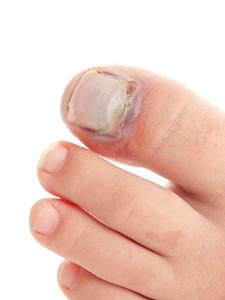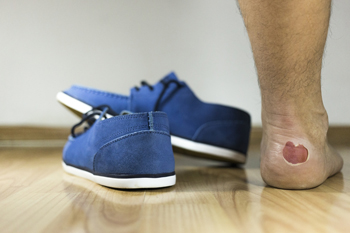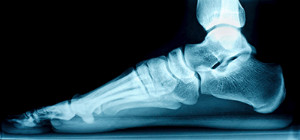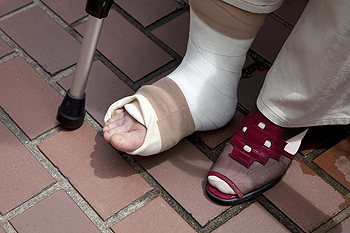Freehold (732) 294-9393
Freehold (732) 294-9393
 If your child has endured a fall or has dropped a heavy object on the toe, he or she may have a broken toe. There are several symptoms that are associated with this condition, including noticing if the skin is cut, experiencing severe pain and discomfort, as well as swelling or bruising. Additionally, wearing shoes may prove to be difficult, and a larger size shoe may need to be purchased as the healing process commences. Many broken toes are treated with a process that is referred to as buddy-taping. This is defined as taping the injured toe to the toe next to it and this may provide additional support. If you think your child may have a broken toe, please speak to a podiatrist as quickly as possible so proper treatment options can be discussed.
If your child has endured a fall or has dropped a heavy object on the toe, he or she may have a broken toe. There are several symptoms that are associated with this condition, including noticing if the skin is cut, experiencing severe pain and discomfort, as well as swelling or bruising. Additionally, wearing shoes may prove to be difficult, and a larger size shoe may need to be purchased as the healing process commences. Many broken toes are treated with a process that is referred to as buddy-taping. This is defined as taping the injured toe to the toe next to it and this may provide additional support. If you think your child may have a broken toe, please speak to a podiatrist as quickly as possible so proper treatment options can be discussed.
Broken toes may cause a lot of pain and should be treated as soon as possible. If you have any concerns about your feet, contact Dr. Henry Miller from New Jersey. Our doctor will treat your foot and ankle needs.
What Is a Broken Toe?
A broken toe occurs when one or more of the toe bones of the foot are broken after an injury. Injuries such as stubbing your toe or dropping a heavy object on it may cause a toe fracture.
Symptoms of a Broken Toe
Although the injured toe should be monitored daily, it is especially important to have a podiatrist look at your toe if you have severe symptoms. Some of these symptoms include worsening or new pain that is not relieved with medication, sores, redness, or open wounds near the toe.
If you have any questions, please feel free to contact our office located in Freehold, NJ . We offer the newest diagnostic and treatment technologies for all your foot care needs.
 If you notice a small area on your foot filled with fluid, you may have what is referred to as a blister. The fluid acts as a natural barrier that protects the new skin from any damage or injury that may occur. Friction is generally the main cause of blisters developing on the feet and may form as a result of wearing shoes that are too tight. Other causes of blisters may originate from an insect bite, or skin conditions that may include impetigo, chickenpox or a sunburn. Research has shown the importance of letting the blister drain on its own, and this may prevent an infection from developing. There may be ways to prevent blisters from forming, and these may include wearing footwear that fits properly, dusting your feet with powder, which may aid in absorbing excess sweat, or using sunscreen. Most blisters will heal on their own, but if you are experiencing a blister that keeps reoccurring or not healing properly, it is suggested to speak with podiatrist who can advise you on proper treatment and prevention techniques.
If you notice a small area on your foot filled with fluid, you may have what is referred to as a blister. The fluid acts as a natural barrier that protects the new skin from any damage or injury that may occur. Friction is generally the main cause of blisters developing on the feet and may form as a result of wearing shoes that are too tight. Other causes of blisters may originate from an insect bite, or skin conditions that may include impetigo, chickenpox or a sunburn. Research has shown the importance of letting the blister drain on its own, and this may prevent an infection from developing. There may be ways to prevent blisters from forming, and these may include wearing footwear that fits properly, dusting your feet with powder, which may aid in absorbing excess sweat, or using sunscreen. Most blisters will heal on their own, but if you are experiencing a blister that keeps reoccurring or not healing properly, it is suggested to speak with podiatrist who can advise you on proper treatment and prevention techniques.
Blisters are prone to making everyday activities extremely uncomfortable. If your feet are hurting, contact Dr. Henry Miller of New Jersey. Our doctor can provide the care you need to keep you pain-free and on your feet.
Foot Blisters
Foot blisters develop as a result of constantly wearing tight or ill-fitting footwear. This happens due to the constant rubbing from the shoe, which can often lead to pain.
What Are Foot Blisters?
A foot blister is a small fluid-filled pocket that forms on the upper-most layer of the skin. Blisters are filled with clear fluid and can lead to blood drainage or pus if the area becomes infected.
How Do Blisters Form?
Blisters on the feet are often the result of constant friction of skin and material, usually by shoe rubbing. Walking in sandals, boots, or shoes that don’t fit properly for long periods of time can result in a blister. Having consistent foot moisture and humidity can easily lead to blister formation.
Prevention & Treatment
It is important to properly care for the affected area in order to prevent infection and ease the pain. Do not lance the blister and use a Band-Aid to provide pain relief. Also, be sure to keep your feet dry and wear proper fitting shoes. If you see blood or pus in a blister, seek assistance from a podiatrist.
If you have any questions, please feel free to contact our office located in Freehold, NJ . We offer the newest diagnostic and treatment technologies for all your foot care needs.
Read more about Blisters The medical condition that is referred to as flat feet is a result of the absence of the arch that feet generally have. This ailment is also known as fallen arches and is noticeable when the feet lie flat without a gap between the foot and the floor. Research has shown that genetics may play a significant role in the development of flat feet. Additionally, other causes may include arthritis or a ruptured tendon as a result of a possible injury. Patients who have this condition may observe pain or stiffness that may be present in the inner side of the ankle or where the arch would generally be. There may be effective treatment methods for this ailment, including wearing shoes that offer adequate support, in addition to possibly wearing orthotics. If you are experiencing pain and discomfort as a result of having flat feet, please speak to a podiatrist who can properly address any concerns you may have.
The medical condition that is referred to as flat feet is a result of the absence of the arch that feet generally have. This ailment is also known as fallen arches and is noticeable when the feet lie flat without a gap between the foot and the floor. Research has shown that genetics may play a significant role in the development of flat feet. Additionally, other causes may include arthritis or a ruptured tendon as a result of a possible injury. Patients who have this condition may observe pain or stiffness that may be present in the inner side of the ankle or where the arch would generally be. There may be effective treatment methods for this ailment, including wearing shoes that offer adequate support, in addition to possibly wearing orthotics. If you are experiencing pain and discomfort as a result of having flat feet, please speak to a podiatrist who can properly address any concerns you may have.
Flatfoot is a condition many people suffer from. If you have flat feet, contact Dr. Henry Miller from New Jersey. Our doctor will treat your foot and ankle needs.
What Are Flat Feet?
Flatfoot is a condition in which the arch of the foot is depressed and the sole of the foot is almost completely in contact with the ground. About 20-30% of the population generally has flat feet because their arches never formed during growth.
Conditions & Problems:
Having flat feet makes it difficult to run or walk because of the stress placed on the ankles.
Alignment – The general alignment of your legs can be disrupted, because the ankles move inward which can cause major discomfort.
Knees – If you have complications with your knees, flat feet can be a contributor to arthritis in that area.
Symptoms
Treatment
If you are experiencing pain and stress on the foot you may weaken the posterior tibial tendon, which runs around the inside of the ankle.
If you have any questions please feel free to contact our office located in Freehold, NJ . We offer the newest diagnostic and treatment technologies for all your foot and ankle needs.
 People who enjoy the sport of running or who participate in jumping activities may know the importance of preventing injuries that may occur to the foot and ankle. Research has shown when the muscles are properly stretched and warmed up prior to engaging in sporting activities, the possibility of incurring this type of injury may be diminished. It is generally beneficial to wear shoes that are designed for your foot structure, and this may aid in maintaining stability and comfort. When the heels of the shoes wear out from frequent running, replacement should occur as quickly as possible, and this may prevent unwanted injuries from occurring. If a minor injury should happen, resting the foot for the proper amount of time may aid in resuming your sport of choice. If you have endured an injury to the foot or ankle, it is suggested to speak with a podiatrist, so proper treatment options can be discussed.
People who enjoy the sport of running or who participate in jumping activities may know the importance of preventing injuries that may occur to the foot and ankle. Research has shown when the muscles are properly stretched and warmed up prior to engaging in sporting activities, the possibility of incurring this type of injury may be diminished. It is generally beneficial to wear shoes that are designed for your foot structure, and this may aid in maintaining stability and comfort. When the heels of the shoes wear out from frequent running, replacement should occur as quickly as possible, and this may prevent unwanted injuries from occurring. If a minor injury should happen, resting the foot for the proper amount of time may aid in resuming your sport of choice. If you have endured an injury to the foot or ankle, it is suggested to speak with a podiatrist, so proper treatment options can be discussed.
Foot and ankle trauma is common among athletes and the elderly. If you have concerns that you may have experienced trauma to the foot and ankle, consult with Dr. Henry Miller from New Jersey. Our doctor will assess your condition and provide you with quality foot and ankle treatment.
Foot and ankle trauma cover a range of injuries all over the foot; common injuries include:
Symptoms
Symptoms of foot and ankle injuries vary depending on the injury, but more common ones include:
Diagnosis
To properly diagnose the exact type of injury, podiatrists will conduct a number of different tests. Some of these include sensation and visual tests, X-rays, and MRIs. Medical and family histories will also be taken into account.
Treatment
Once the injury has been diagnosed, the podiatrist can than offer the best treatment options for you. In less severe cases, rest and keeping pressure off the foot may be all that’s necessary. Orthotics, such as a specially made shoes, or immobilization devices, like splints or casts, may be deemed necessary. Finally, if the injury is severe enough, surgery may be necessary.
If you have any questions, please feel free to contact our office located in Freehold, NJ . We offer the newest diagnostic and treatment technologies for all your foot care needs.